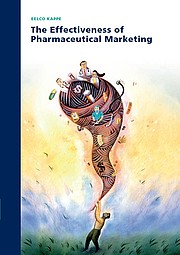The Effectiveness of Pharmaceutical Marketing Defended on Friday, 24 June 2011
Pharmaceutical marketing effectiveness comprises the measurement of the impact of marketing efforts of pharmaceutical firms towards doctors and patients. These firms spend billions of dollars yearly to promote their prescription drugs. This dissertation provides empirical analyses and methods to contribute to several substantial problems on pharmaceutical marketing effectiveness. Using unique data in every essay, it studies the role of the firm, sales rep and doctor in pharmaceutical marketing. The first essay evaluates the size of the sales force and the allocation of sales calls among doctors. In particular, it provides a method to gauge a yet-to-be-enacted firm-initiated policy shift. The second essay studies the effectiveness of the information content provided in sales calls. The main questions evolve around the discussion of positively biased drug information and the responsiveness of doctors to that. In the third essay, the sales success of products in science-based markets is investigated and specifically how scientific reviews influence sales and marketing expenditures to users and experts.
The essays reveal important implications for academics and managers. For academics: (i) a new alternative to gauge policy shifts is offered; (ii) a model is offered to analyze the effectiveness of sales message content; and (iii) scientific reviews should be considered to correctly measure pharmaceutical marketing effectiveness. The implications for managers are: (i) the market leader is able to buck the trend in increasing sales forces; (ii) sales reps discuss positively biased information too often, which is counterproductive in the long run; and (iii) scientific reviews on products should be actively considered as a part of the marketing mix.
Keywords
pharmaceutical marketing, detailing, marketing strategy, prescription drugs, policy shift, sales message content, science-based markets, scientific reviews, endogeneity, data enrichment, hierarchical bayes, VAR model, VEC model












